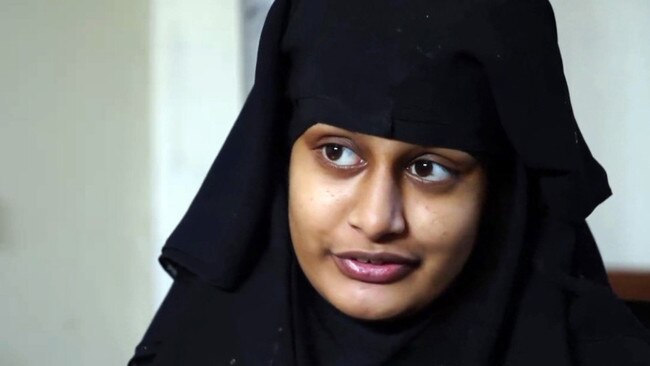West gets tough on women of terror
The Australian federal government has proposed laws that could delay ISIS woman and their teenage children from coming back.

Two of Australia’s closest allies have hardened their position on female Islamic State members by permanently stopping their return, as the federal government unveiled proposed laws that could delay Australian women and their teenage children from coming back.
As Home Affairs Minister Peter Dutton introduced a bill to parliament that would stop citizens aged at least 14 from returning to Australia for up to two years, the US government declared “jihadi bride” Hoda Muthana was no longer a citizen.
She had been married to former Melbourne Islamic State fighter Suhan Rahman until his 2015 death, and was located by journalists with her 18-month-old child from her second marriage at a Syrian refugee camp.
This followed Britain’s decision to strip teenage mother Shamima Begum of her British citizenship after the long-time Islamic State supporter was also found in a camp.
The US and Britain, along with Australia, New Zealand and Canada, are members of the Five Eyes intelligence network.
About 100 Australians are believed to be in the conflict zone, but the government has not detailed their gender or ages.
ASIO has for more than two years warned of the potential risk posed not just by adults who joined the conflict, but also says “up to 70 children of Australians have been exposed to extremist groups in Syria or Iraq”.
The Australian is aware of at least nine females who travelled to Syria either as children or adults, and more are understood to have entered the conflict zone.
The new Temporary Exclusion Orders bill introduced into parliament yesterday allow security agencies to delay a person’s return to Australia for up to two years if the minister believes it could prevent terrorism.
The person is also stopped from getting a passport, having to rely on government-issued temporary travel documents to travel internationally.
Mr Dutton said yesterday the government needed to control the return of Australians who travelled to the terror group’s territory: “It is vital for our national security that we deal with Australians who travelled to the conflict zone in Iraq and Syria as far from our shores as possible.”
But the University of Queensland’s Rebecca Ananian-Welsh, an expert on national security law, said the new laws — if enacted — could raise constitutional issues.
“This seems to be a version of the citizenship-stripping laws designed for sole Australian citizens,” Dr Ananian-Welsh said.
“That’s where the constitutional issues arise, because the High Court hasn’t explained what it means to be an Australian citizen under the constitution. But one strong argument is that if citizenship entitles us to anything, then it’s a right to be in our country of citizenship.”
She also said, if the government had evidence of terrorist activity, “why don’t we charge them rather than letting them roam free in another part of the world?”
“There are quite a few examples of Australians being overseas and effectively being able to radicalise people all over the world by using the internet, so this kind of exclusion order wouldn’t stop anything like that from happening,” she said.
“Even if there wasn’t enough evidence to support a criminal prosecution, we have our control orders system.”


